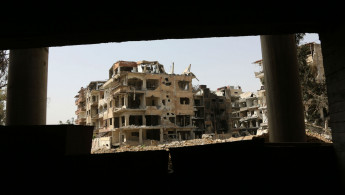UN: Syria must respond to chemical weapons questions
The UN's Secretary-General said that Syria's failure to answer questions on its chemical weapons programme "remains a source of very deep concern" on Friday.
Antonio Guterres said that while the Syrian government had addressed some questions raised by the chemical watchdog, "other questions regrettably remain unanswered".
Guterres urged Syria to resolve all the outstanding issues in a letter circulated transmitting the Organisation for the Prohibition of Chemical Weapons' report.
Ahmet Uzumcu, the watchdog's director, said that he had repeated his queries to the Syrian authorities saying that its declarations of chemical weapons "remain and require a response".
Guterres said "the profoundly alarming allegations" of chemical weapons use in the Damascus suburb of Douma on 7 April continues to impress the need for a new body to determine responsibility for chemical attacks.
Samples were brought back for analysis at the OPCW-designated laboratories, and results could take at least three to four weeks. Inspectors will merely identify whether or not a chemical attack would take place, not to apportion blame.
In November, a Western-backed council resolution that would have extended the mandate of a joint UN-OPCW body was vetoed by Russia, making accountability exceedingly difficult.
Guterres warned that "impunity and the absence of international consensus on accountability are escalating the conflict".
He reiterated that "any confirmed use of chemical weapons by any party to the conflict is abhorrent, reprehensible and a clear violation of international law" - and perpetrators must be held accountable.
Arrangements for destroying the last two chemical weapons production facilities in Syria "are expected to be finalised in the coming weeks" and the report covers the period from 24 March to 23 April.
"Once the arrangements are in place," it said, "destruction operations are expected to take two to three months, subject to security conditions."
The suspected poison gas attack has sparked an ongoing clash of narratives between the West and the governments of Syria and its key ally, Russia. Damascus and Moscow insist there was no chemical weapons attack.
Opposition activists and first responders who witnessed the attack in Douma, which was under rebel control at the time, say it was carried out by regime forces. Many of the victims suffocated in an underground shelter where they were hiding from government airstrikes, the activists said.
Following the suspected chemical attack, the United States, France and the UK launched joint punitive airstrikes targeting suspected Syrian chemical weapons facilities on 14 April.
Syrian President Bashar al-Assad and his supporters have consistently claimed that chemical and other attacks were in fact staged, and that an army of actors including children has been trained to fake injury on a massive scale.




 Follow the Middle East's top stories in English at The New Arab on Google News
Follow the Middle East's top stories in English at The New Arab on Google News
![Israeli forces ordered bombed Gaza's Jabalia, ordering residents to leave [Getty]](/sites/default/files/styles/image_330x185/public/2176418030.jpeg?h=a5f2f23a&itok=_YGZaP1z)

